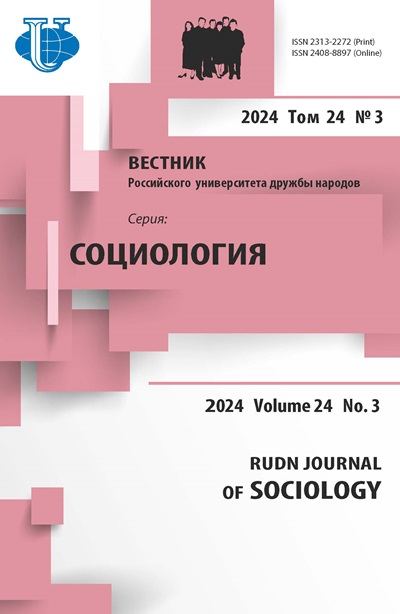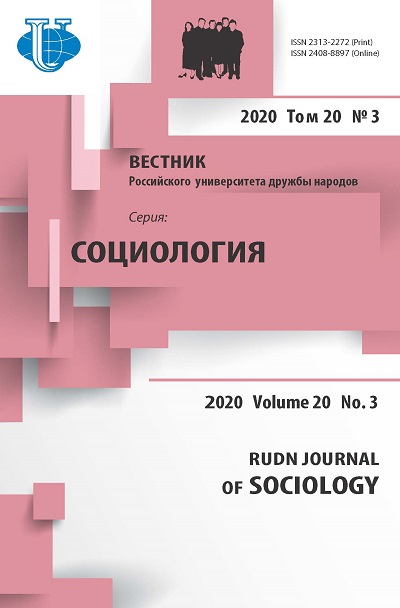Media consumption of different cohorts: TV and Internet
- Authors: Nazarov M.M1, Ivanov V.N1,2, Kublitskaya E.A1
-
Affiliations:
- Institute of Socio-Political Research of the FCTAS RAS
- RUDN University
- Issue: Vol 20, No 3 (2020)
- Pages: 560-571
- Section: Contemporary society: the urgent issues and prospects for development
- URL: https://journals.rudn.ru/sociology/article/view/24536
- DOI: https://doi.org/10.22363/2313-2272-2020-20-3-560-571
Cite item
Full Text
Abstract
The article considers the dynamics of the TV and Internet consumption of different cohorts under the dramatic changes in the Russian media landscape. In the last decade, the media environment has reached the mass scale in the use of the latest communication technologies based on the high-speed mobile Internet and its various apps. The results of the comparison of the studies of 2012 and 2017 indicate multidirectional trends: an increase in the average daily time of the Internet use in the middle-age and partly elder cohorts, and a moderate increase in the younger groups. The duration of TV viewing is a cyclic phenomenon determined by the stages of life cycle and socialization: the TV consumption of the same cohorts tends to decrease in a five-year interval. According to the theory of media substitution, the Internet is partly a functional alternative to TV for it allows the needs of the audience to be more fully satisfied and to develop on the basis of new technological opportunities. The article also considers features of the media consumption of the digital generation (millennials). This group is internally very different: it consists of several age and social-professional subgroups with serious differences in the average daily TV and Internet consumption. All these trends of the media consumption changed under the covid-19 crisis: changes in the mode of life and a fundamentally different information agenda determined an increase in the media use, primarily TV and the Internet. The long-term trend of the gradual decrease of the TV-audience changed: the average TV viewing increased in all cohorts. Under the crisis, the leading functions of the media - information and recreation - are more in demand than before.
About the authors
M. M Nazarov
Institute of Socio-Political Research of the FCTAS RAS
Author for correspondence.
Email: vy175867@yandex.ru
доктор политических наук, главный научный сотрудник Института социально-политических исследований
Fotievoy St., 6-1, Moscow, 119333, RussiaV. N Ivanov
Institute of Socio-Political Research of the FCTAS RAS; RUDN University
Email: vilen_ivanov@bk.ru
доктор философских наук, член-корреспондент и советник Российской академии наук; главный научный сотрудник Института социально-политических исследований Федерального научно-исследовательского социологического центра Российской академии наук; профессор кафедры социологии Российского университета дружбы народов
Fotievoy St., 6-1, Moscow, 119333, Russia; Miklukho-Maklaya St., 6, Moscow, 117198, RussiaE. A Kublitskaya
Institute of Socio-Political Research of the FCTAS RAS
Email: eakubl@yandex.ru
кандидат философских наук, ведущий научный сотрудник Института социально-политических исследований
Fotievoy St., 6-1, Moscow, 119333, RussiaReferences
- Ачкасова К. Медиапотребление в новой реальности / Achkasova K. Mediapotreblenie v novoj realnosti [Media consumption in the new reality]. URL: https://mediascope.net/news/1177564 (In Russ.).
- Беляева Л.А. Социальный портрет возрастных когорт в постсоветской России // Социологические исследования. 2004. № 10 / Beljaeva L.A. Socialny portret vozrastnyh kogort v postsovetskoj Rossii [Social portrait of the cohorts in post-Soviet Russia]. Sociologicheskie Issledovanija 2004; 10 (In Russ.).
- Вьюгина Д.М. Интернет в ежедневном медиапотреблении цифрового поколения России // Медиаскоп. 2018. Вып. 3 / Vjugina D.M. Internet v ezhednevnom mediapotreblenii tsifrovogo pokolenija Rossii [Internet in the daily media consumption of the Russian digital generation]. Mediaskop. 2018; 3 (In Russ.).
- Годик Ю.А. «Цифровое поколение» и новые медиа // Медиаскоп. 2011. № 2 / Godik Ju.A. “Tsifrovoe pokolenie” i novye media [‘Digital generation’ and the new media]. Mediaskop 2011; 2 (In Russ.).
- Ковалев П.А. Российская телевизионная аудитория. М., 2007 / Kovalev P.A. Rossijskaja televizionnaja auditorija [Russian TV audience]. Moscow; 2007 (In Russ.).
- Назаров М.М., Ковалев П.А. Изменение медиасреды и современные практики чтения // Социологические исследования. 2017. № 2 / Nazarov M.M., Kovalev P.A. Izmenenie mediasredy i sovremennye praktiki chtenija [Media landscape changes and contemporary reading practices]. Sociologicheskie Issledovanija 2017; 2 (In Russ.).
- Полуэхтова И.А. Социокультурная динамика российской аудитории телевидения. М., 2010 / Poluekhtova I.A. Sociokulturnaja dinamika rossijskoj auditorii televidenija [Sociocultural Dynamics of the Russian TV audience]. Moscow; 2010 (In Russ.).
- Радаев В.В. Миллениалы на фоне предшествующих поколений: эмпирический анализ // Социологические исследования. 2018. № 3 / Radaev V.V. Millenialy na fone predshestvujushhih pokolenij: empirichesky analiz [Millennials versus previous generations: An empirical analysis]. Sociologicheskie Issledovanija 2018; 3 (In Russ.).
- Социологический энциклопедический словарь / Под ред. Г.В. Осипова. М., 1998 / Sociologichesky entsiklopedichesky slovar [Sociological Encyclopedic Dictionary]. Pod red. G.V. Osipova. Moscow; 1998 (In Russ.).
- Троцук И.В. «Умолчания» поколенческого анализа: объективное и субъективное значение возраста // Вестник РУДН. Серия: Социология. 2015. № 2 / Trotsuk I.V. “Umolchanija” pokolencheskogo analiza: ob’ektivnoe i sub’ektivnoe znachenie vozrasta [‘White spots’ of the generational analysis: Objective and subjective meaning of the age]. RUDN Journal of Sociology. 2015; 2 (In Russ.).
- Хахулина Л.А. Динамика отношения к рыночной реформе (анализ молодежных когорт начала и конца 90-х годов) // Мониторинг общественного мнения. Экономические и социальные перемены. 2001. № 1 / Khakhulina L.A. Dinamika otnoshenija k rynochnoj reforme (analiz molodezhnyh kogort nachala i kontsa 90-h godov) [Dynamics of attitudes to the market reform (analysis of the youth cohorts of the early and late 1990s)]. Monitoring Obshhestvennogo Mnenija. 2001; 1 (In Russ.).
- Aroldi P., Colombo F. Generational belonging and mediascape in Europe. Journal of Social Science Education. 2007; 6 (1).
- Aroldi P. Generational belonging between media audiences and ICT users. Broadband Society and Generational Changes. Colombo F., Fortunati L. (Eds.). Berlin; 2011.
- Blumler J.G. The role of theory in uses and gratifications studies. Communication Research. 1979; 6 (1).
- Bolin G. Passion and nostalgia in generational media experiences. European Journal of Cultural Studies. 2016; 19 (3).
- Bondad-Brown B.A., Rice R.E., Pearce K.E. Influences on TV viewing and online user-shared video use: Demographics, generations, contextual age, media use, motivations, and audience activity. Journal of Broadcasting & Electronic Media. 2012; 56 (4).
- Brennan D. Connected Television. London; 2012.
- Bruce S., Yearley S. The Sage Dictionary of Sociology. London; 2006.
- Buckingham D., Willet R. Digital Generations. Children, Young People and New Media. London; 2006.
- Centorrino M. The image of the ‘digital native’ and the generation gap. Broadband Society and Generational Changes. Colombo F., Fortunati L. (Eds.). Berlin; 2011.
- Chandler D., Munday R. Dictionary of Media and Communication. Oxford; 2020.
- Danowski J. A., Ruchinskas J.E. Period, cohort, and aging effects. A study of television exposure in presidential election campaigns, 1952-1980. Communication Research. 1983; 10 (1).
- Desjardins J. The rising speed of technological adoption. URL: https://www.visualcapitalist.com/rising-speed-technological-adoption.
- Dimmick J.W., McCain T.A., Bolton W.T. Media use and the life span. Notes on theory and method. American Behavioral Scientist. 1979; 23 (1).
- Doyle Ch. Oxford Dictionary of Marketing. Oxford; 2011.
- Elvestad E., Phillips A. Misunderstanding News Audiences, Seven Myths of Social Media Era. London; 2018.
- Five myths about millennials debunked. Study reveals surprising similarities between generations. URL: https://www.cokesolutions.com/trends-insights/articles/five-myths-about-millennials-debunked.
- Gumpert G., Cathcart R. Media grammars, generations, and media gaps. Critical Studies in Media Communication. 1985; 2 (1).
- Hepp A., Berg M., Roitsch C. A processual concept of media generation. The media-generational positioning of elderly people. Nordicom Review. 2017; 38 (1).
- How important are millennials to marketers? URL: https://www.mediadynamicsinc.com/media-matters/june-1-2018.
- Howe N., Strauss W. Millennials Rising: The Next Great Generation. New York; 2000.
- Isenbart J., Neumüller G. Screen force. Deconstructing the ‘digital natives’. What’s hype, what’s real? Presentation on EGTA Market Intelligence Meeting, 28.01.2016.
- Mannheim K. The problem of generations. Essays of the Sociology of Knowledge. P. Kecskemeti (Ed.). New York; 1952.
- Newell J., Pilotta J., Thomas J. Mass media displacement and saturation. International Journal of Media Management. 2008; 10 (4).
- Palfrey J., Gasser U. Born Digital. Understanding the First Generation of Digital Natives. New York; 2008.
- Peiser W. The television generation’s relation to the mass media in Germany: Accounting for the impact of private television. Journal of Broadcasting & Electronic Media. 1999; 43 (3).
- Stuck at home: Media behavior in the time of coronavirus. URL: https://magnaglobal.com/stuck-at-home-media-behavior-in-the-time-of-coronavirus-ed-4.














